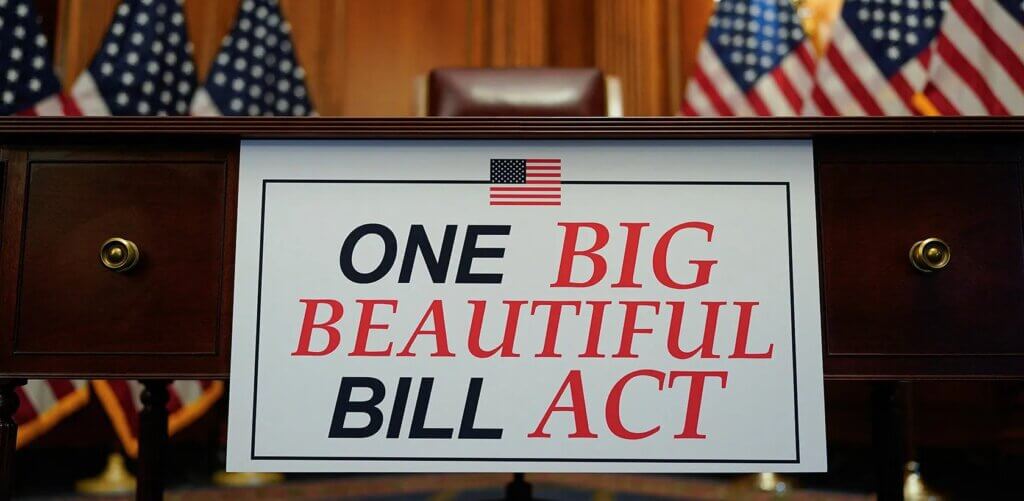
One Big Beautiful Bill: What’s Beneath the Buzz?
Tax PlanningSep 24, 2025
The 4th of July kicked summer into high gear as it always seems to do. Summer flew by, Labor Day passed, and now we are officially into the fall season. One thing that many people put off until after Labor Day was looking into how the One Big Beautiful Bill Act (OBBBA), signed into law on the 4th of July, impacts their respective situations. We decided to put together a summary of how it impacts most people that we work with and talk to. We will preface the article with a disclaimer that you should consult with a tax professional before taking any action on the items mentioned.
Social Security Taxes
Some headlines would lead you to believe that Social Security is no longer taxable. Sorry to burst your bubble, but that is not completely true. We wrote an article about how Social Security can be taxed and it can be accessed by clicking here. Everything in that article still applies. However, the OBBBA added an extra deduction for people who are 65 or older. The deduction is $6,000 for individuals and $12,000 for married couples filing jointly where both spouses are over 65. The deduction phases out for single filers with a modified adjusted gross income over $75,000 and for joint filers over $150,000. While it doesn’t explicitly eliminate social security taxes, some analysts suggest that a large majority of Social Security recipients will no longer pay taxes on their benefits with this added deduction. This provision is effective from 2025 to 2028.
Extension of Tax Cuts and Jobs Act
There was a lot of pressure for the administration to get this done because if they didn’t, all the cuts from the first Trump Administration would sunset and taxes would increase for many Americans in 2026. Instead, the OBBBA made those tax rates permanent. It also made the enhanced standard deduction permanent with incremental inflation adjustments. Finally, it increased the federal estate and gift tax exclusions to $15 million for individuals and $30 million for couples for 2026 with inflation adjustments in the subsequent years. Had they not acted on these limits, they would have reverted to approximately half their current levels.
SALT Deduction
This has been an item of contention since the day the 2017 Tax Cuts and Jobs Act was passed. The cap has been increased to $40,000 for both single filers and joint filers effective for the 2026 tax year. The deduction phases out when adjusted gross income exceeds $500,000. It is reduced by 30% of the modified adjusted gross income. This increase is effective for tax years 2026 through 2029 and then reverts to the current $10,000 in 2030.
Charitable Donations
There were a few changes to the charitable donation deduction. People who don’t itemize are allowed a deduction of $1,000 for single filers and $2,000 for joint filers in addition to the standard deduction. For itemizers, a new floor of 0.50% of adjusted gross income was put in place. For example, a family with adjusted gross income of $500,000 would not be able to deduct the first $2,500 (0.50% of $500,000) of charitable donations.
529 Plans
The rising cost of private K-12 education was finally addressed in this bill. Effective in 2026, the annual withdrawal limit for K-12 withdrawals is increased to $20,000 from $10,000. It also expanded the definition of qualified K-12 expenses to include certain non-tuition costs effective immediately.
Business Tax Provisions
The Qualified Business Income (QBI) deduction was made permanent while expanding eligibility and clarifying deduction rules. This applies to qualifying business owners of pass-through entities, including LLCs, partnerships, and S-corps. It also permanently extends bonus deprecation, which allows businesses to immediately deduct 100% of the cost of eligible property acquired or placed in service after January 19, 2025. Additionally, it expands eligibility to include manufacturing, production, and refining property.
This article only scratches the surface of the OBBBA. It is a 900 page document and there are still questions to be answered on certain aspects of the bill. This new tax legislation is a reminder that financial planning is an evolving process, and it is important that you review your plan regularly. Take the time to discuss this with the professionals that you trust to see if there are any new planning opportunities for you and your family.
Disclosure:
It is important to remember that investments in securities involve risk, including the potential loss of principal invested. Past performance is no guarantee of future results. Diversification does not guarantee a profit or protect against loss in a declining financial market. Alliance also does not make any representations as to the accuracy, timeliness, suitability, completeness, or relevance of any information prepared by any unaffiliated third party mentioned in this communication and takes no responsibility. Federal taxes; states may differ. This is not intended to be individual tax advice. Please consult your tax professional. Additional disclosures can be found by visiting alliancewealthadvisors.com/legal-disclosures.


